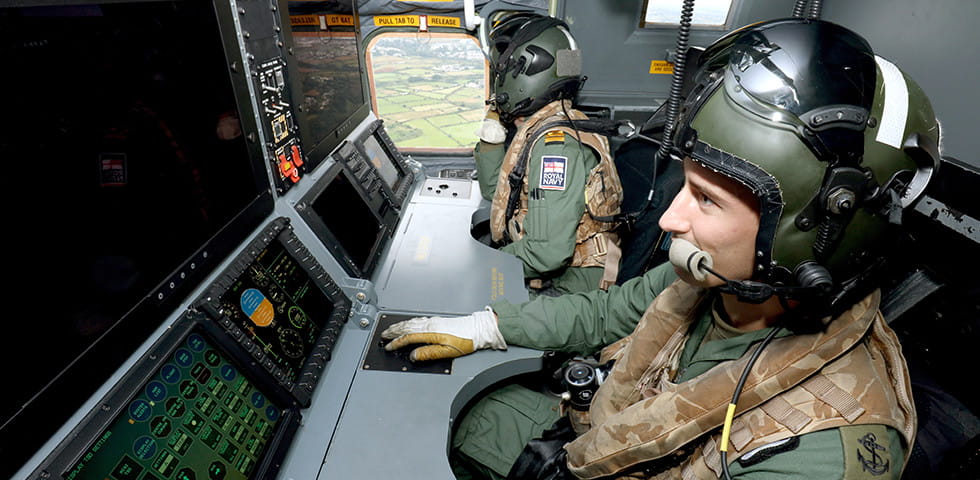Aircrewman
Become essential to Merlin helicopter operations, in the thick of the action on Commando or Anti-Submarine missions.
- £18,500 - £58,000
- GCSEs
- Fleet Air Arm
- Aviation
- Rating level
£25,200
£58,000
2
Free
Travel
6 weeks

I get deployed with a whole squadron, which is great from a social and professional perspective, and being part of all the planning and execution of operations is really rewarding. I get a lot out of every day.
Role details
What you’ll do
As an Aircrewman in the Fleet Air Arm, you’ll be essential to our Merlin helicopter operations. This is a role with a unique level of responsibility, not least because you’ll be the only rating on board the aircraft. Once you’ve joined as an Aircrewman, you will be streamed into either an Anti-Submarine or a Commando role during your training. Whichever route you go down you’ll find yourself in the thick of the action. That means planning and executing some of our most crucial missions, from maritime surveillance to frontline combat.
Your role
- As an Anti-Submarine Warfare Aircrewman, you’ll focus on the essential airborne surveillance and detection that is so central to protecting our nation, and our fellow NATO members, against a constant threat.
- So much of submarine warfare is about stealth. You’ll assist your Observer by monitoring potential threats, and ensuring that they cannot remain hidden. For that reason, you’ll need to be immensely reliable and have a keen eye for detail, because if one slips through the net, your crewmates could be in danger.
- As a Commando Aircrewman, you’ll be involved in frontline combat operations, both in support of our own forces, and those of our partners.
- On a Commando Merlin helicopter there’s no Observer, so you’ll take on elements of that role. That means working directly with the Pilot to search for targets, and operating the weapons if needed.
Pay & benefits
- A salary that rises to at least £25,200 as soon as you finish training
- A salary of £58,000 as you progress through your career
- Six weeks of paid holiday every year
- Subsidised travel and accommodation
- Excellent pension scheme
Skills for life
Qualifications you‘ll gain
- Study for GCSEs, A-Levels, NVQs or a degree
- Gain specialist vocational qualifications as your career progresses
Skills you‘ll develop
- In the two years before you’re deployed on frontline operations, you’ll learn about how airborne missions work, and how to use our specialist equipment
- An in-depth knowledge of avionics, from how the aircraft is prepared, to its capabilities when it’s airborne
- A Foundation Degree in Aviation Systems Management
Eligibility
- You’ll need to be aged at least 15 years and 9 months old when you apply, and under 34 years old when you begin basic training
- A high score on the Flight Aptitude Tests (FATs) is required
- You’ll need at least 2 GCSEs at grades A-C (9-4) (or Scottish equivalent) including English and Maths
- You must be a British or a Dual National
- You need to be a minimum height of 151.5cm
- A Body Mass Index (BMI) between 18 and 28 (between 17 and 27 if under 18)
Skills & interests
- A passion for working with state-of-the-art aircraft
- A keen attention to detail
- Good hand-to-eye coordination
- A willingness to learn new skills
- An adventurous spirit
Joining process
From picking your role to starting on your first day, these are the steps you'll take to join as a rating.
Submit an application
Defence Aptitude Assessment (DAA)
You’ll be tested on: Verbal Reasoning, Numerical Reasoning, Work Rate, Spatial Reasoning, Electrical Comprehension and Mechanical Comprehension.
To prepare, you can practise the DAA
Interview
A formal interview to talk through your suitability for the role. This is normally conducted using your own device over the Shine video platform
Flight Aptitude Tests (FATs)
Candidate Preparation Course (CPC)
Start training
Once you've passed a Security Check, you'll be offered a place at HMS Raleigh
Career progression
Got a question?
Our virtual recruiter is available to answer your questions 24 hours a day
